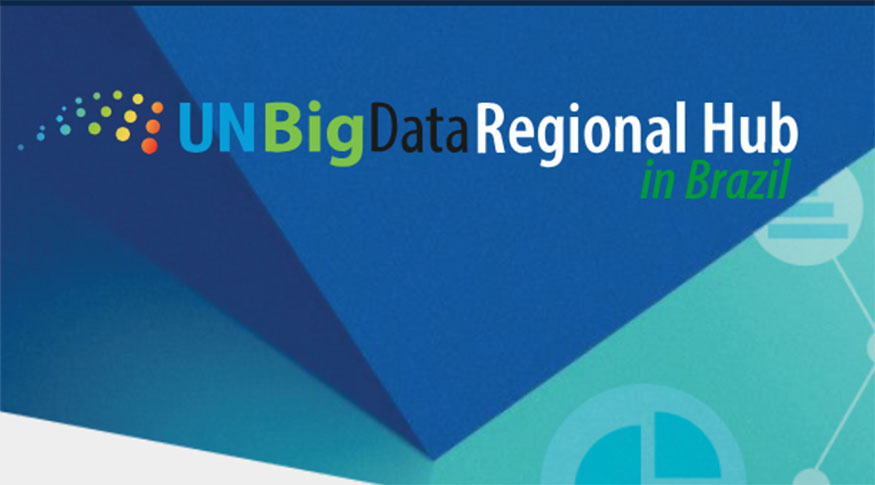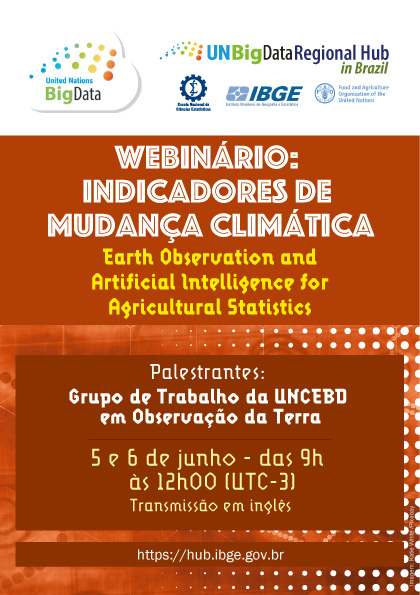Earth Observation and AI in agricultural statistics are topics of the Regional Hub for Big Data webinar
May 27, 2025 02h00 PM | Last Updated: May 28, 2025 03h53 PM

The UN Big Data Regional Hub in Brazil is promoting a series of webinars about the production of climate change indicators. The next seminar will be held on June 5 and 6, at 9 am, and will discuss the use of Earth Observation and Artificial Intelligence for Agricultural Statistics with experts from the UN Earth Observation Working Group - UN-CEBD. Free registration is open.
Day 1 (June 5) at 9 am
EO Monitoring and Supervised AI for Crop Mapping
Registration: https://events.teams.microsoft.com/event/364fef40-5964-4076-8b71-d729f4ae0f74@d7dda5bb-4810-469b-a681-7e1bc4b84ce9
Day 2 (June 6) at 9 am
Statistical Integration and Advanced AI for Yield Forecasting
Registration: https://events.teams.microsoft.com/event/4198df14-0b3d-440c-9c0b-d7e2eb198d04@d7dda5bb-4810-469b-a681-7e1bc4b84ce9
The event will be streamed in English. With this seminar, undergraduate students from ENCE can obtain complementary hours upon identification with their full name, and attendance to the event. For receiving certificates, students must send an e-mail to hubrazil@ibge.gov.br.

On June 5, the discussion will be about how Earth Observation (EO) and supervised Artificial Intelligence (AI) have transformed crop mapping and agricultural management. Among the speakers are Sven Gilliams (GEOGLAM), who will speak about the EO application in agriculture with a focus on Latin America and the Caribbean; Zoltan Szantoi (European Space Agency), highlighting the EO infrastructure by means of the WorldCereal and Sen4Stat initiatives; and Kristof Van Tricht (VITO), who will discuss supervised classification for mapping private crops. From the Latin American region, Eduardo Vazquez (INEGI) will present the approach of Mexico to define its agricultural frontiers using EO, whereas Ian Nunes (FAO) will present detection of field boundaries based on AI. The session will be presented by Lorenzo De Simone (FAO), who will also host the event.
On June 6, the event will approach the integration of Earth Observation (EO), statistical modelling and advanced Artificial Intelligence (AI) to improve agricultural yield possibilities. Lorenzo De Simone (FAO) will summarize the main aspects discussed on the first day. Sophie Bontemps (UCLouvain) will show how EO dreived maps can be used as regression models to estimate planted area. A lecturer from NASA Harvest or from CSIRO (to be confirmed) will present AI methods to forecast yield. Gilberto Camara (INPE/UNSD) will simulate the use of EO data processing based on SITS. A team from the Beijing Normal University and from the University of Wuhan will present contributions to a global EO manual and related case studies. Lorenzo De Simone will also guide a discussion panel on EO for statistical insight, followed by a Q&A session.
Climate Change Indicator Series
The Regional Hub for Big Data is hosting a series of webinars to share experiences in using new data sources and technologies for climate change mitigation. Topics covered include biodiversity, tourism sustainability, and the integration of geospatial information for land use monitoring. Sessions are in Spanish or English, and feature experts from Latin America and the Caribbean, as well as from other regions.
The series began in September 2024 and featured webinars on climate change and disaster metrics, tourism sustainability, hydrogeological disasters, remote sensing, geographic information, child climate risk and agricultural and environmental statistics. The seven events brought together 1240 participants from 31 countries: Argentina, Aruba, Belize, Bangladesh, Bolivia, Brazil, Chile, Colombia, Costa Rica, Dominican Republic, Ecuador, El Salvador, Slovenia, Guatemala, Honduras, Jamaica, Mexico, New Zealand, Nicaragua, the Netherlands, Panama, Paraguay, Peru, Rwanda, Saudi Arabia, Trinidad and Tobago, the United States, Uruguay, and Venezuela. Recordings are available on the Hub website. The series will continue with monthly webinars until July 2025.
ENCE/IBGE coordinates UN Regional Hub for Big Data in Brazil

Resulting from a partnership between the IBGE and the UN Statistics Division, the UN Regional Hub for Big Data in Brazil (https://hub.ibge.gov.br) was launched in November 2021 at the 11th Statistical Conference of the Americas, held by the Economic Commission for Latin America and the Caribbean (ECLAC). The Hub is hosted by the National School of Statistical Sciences (ENCE), academic arm of the IBGE, which coordinates the efforts and contributions of the different areas of the Institute in supporting the activities of the Regional Hub.
The project aims at contributing to the advancement of the use of big data to improve the production of official statistics, promoting knowledge sharing and the development of innovative initiatives in Latin America and the Caribbean. In addition to Brazil, four other countries are also part of the initiative as hosts of regional or global hubs: the United Arab Emirates, Indonesia, Rwanda, and China.




















